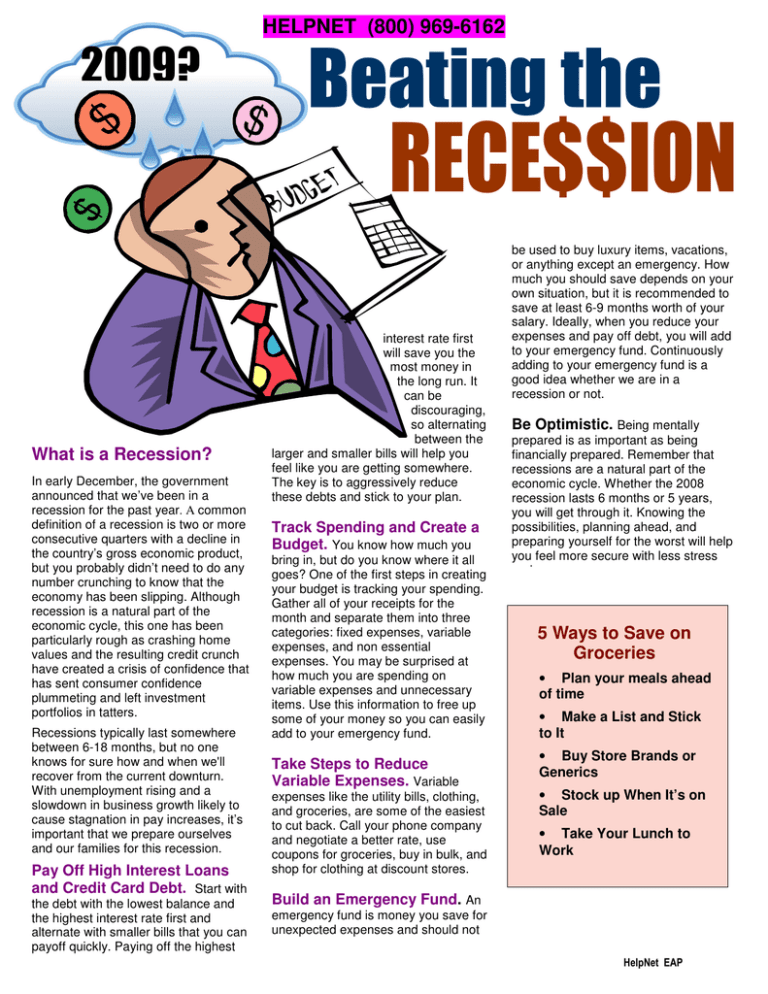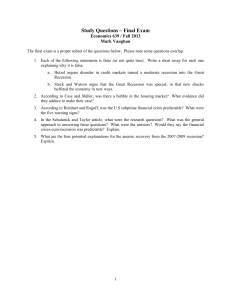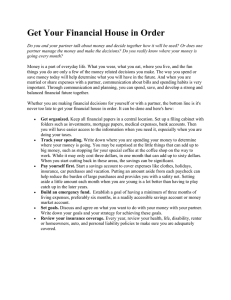HELPNET (800) 969-6162
advertisement

HELPNET (800) 969-6162 2009? Beating the RECE$$ION What is a Recession? In early December, the government announced that we’ve been in a recession for the past year. A common definition of a recession is two or more consecutive quarters with a decline in the country’s gross economic product, but you probably didn’t need to do any number crunching to know that the economy has been slipping. Although recession is a natural part of the economic cycle, this one has been particularly rough as crashing home values and the resulting credit crunch have created a crisis of confidence that has sent consumer confidence plummeting and left investment portfolios in tatters. Recessions typically last somewhere between 6-18 months, but no one knows for sure how and when we'll recover from the current downturn. With unemployment rising and a slowdown in business growth likely to cause stagnation in pay increases, it’s important that we prepare ourselves and our families for this recession. Pay Off High Interest Loans and Credit Card Debt. Start with the debt with the lowest balance and the highest interest rate first and alternate with smaller bills that you can payoff quickly. Paying off the highest interest rate first will save you the most money in the long run. It can be discouraging, so alternating between the larger and smaller bills will help you feel like you are getting somewhere. The key is to aggressively reduce these debts and stick to your plan. Track Spending and Create a Budget. You know how much you bring in, but do you know where it all goes? One of the first steps in creating your budget is tracking your spending. Gather all of your receipts for the month and separate them into three categories: fixed expenses, variable expenses, and non essential expenses. You may be surprised at how much you are spending on variable expenses and unnecessary items. Use this information to free up some of your money so you can easily add to your emergency fund. Take Steps to Reduce Variable Expenses. Variable expenses like the utility bills, clothing, and groceries, are some of the easiest to cut back. Call your phone company and negotiate a better rate, use coupons for groceries, buy in bulk, and shop for clothing at discount stores. be used to buy luxury items, vacations, or anything except an emergency. How much you should save depends on your own situation, but it is recommended to save at least 6-9 months worth of your salary. Ideally, when you reduce your expenses and pay off debt, you will add to your emergency fund. Continuously adding to your emergency fund is a good idea whether we are in a recession or not. Be Optimistic. Being mentally prepared is as important as being financially prepared. Remember that recessions are a natural part of the economic cycle. Whether the 2008 recession lasts 6 months or 5 years, you will get through it. Knowing the possibilities, planning ahead, and preparing yourself for the worst will help you feel more secure with less stress and worry. 5 Ways to Save on Groceries • Plan your meals ahead of time • Make a List and Stick to It • Buy Store Brands or Generics • Stock up When It’s on Sale • Take Your Lunch to Work Build an Emergency Fund. An emergency fund is money you save for unexpected expenses and should not HelpNet EAP



